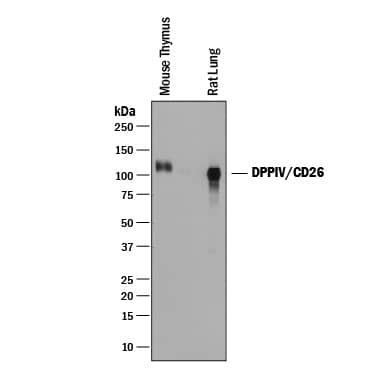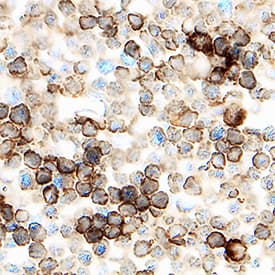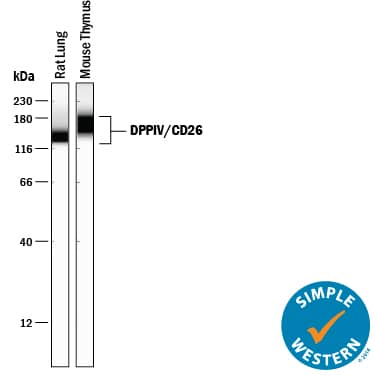Mouse DPPIV/CD26 Antibody
R&D Systems, part of Bio-Techne | Catalog # AF954


Key Product Details
Species Reactivity
Validated:
Cited:
Applications
Validated:
Cited:
Label
Antibody Source
Product Specifications
Immunogen
Ser29-His760
Accession # P28843
Specificity
Clonality
Host
Isotype
Scientific Data Images for Mouse DPPIV/CD26 Antibody
Detection of Mouse and Rat DPPIV/CD26 by Western Blot.
Western blot shows lysates of mouse thymus tissue and rat lung tissue. PVDF membrane was probed with 0.25 µg/mL of Goat Anti-Mouse DPPIV/CD26 Antigen Affinity-purified Polyclonal Antibody (Catalog # AF954) followed by HRP-conjugated Anti-Goat IgG Secondary Antibody (Catalog # HAF019). A specific band was detected for DPPIV/CD26 at approximately 100-110 kDa (as indicated). This experiment was conducted under reducing conditions and using Immunoblot Buffer Group 1.DPPIV/CD26 in Mouse Thymus.
DPPIV/CD26 was detected in immersion fixed frozen sections of mouse thymus using Goat Anti-Mouse DPPIV/CD26 Antigen Affinity-purified Polyclonal Antibody (Catalog # AF954) at 1.7 µg/mL overnight at 4 °C. Tissue was stained using the Anti-Goat HRP-DAB Cell & Tissue Staining Kit (brown; Catalog # CTS008) and counterstained with hematoxylin (blue). Specific staining was localized to lymphocytes. View our protocol for Chromogenic IHC Staining of Frozen Tissue Sections.Detection of Mouse and Rat DPPIV/CD26 by Simple WesternTM.
Simple Western lane view shows lysates of rat lung tissue and mouse thymus tissue, loaded at 0.2 mg/mL. A specific band was detected for DPPIV/CD26 at approximately 144-169 kDa (as indicated) using 5 µg/mL of Goat Anti-Mouse DPPIV/CD26 Antigen Affinity-purified Polyclonal Antibody (Catalog # AF954) followed by 1:50 dilution of HRP-conjugated Anti-Goat IgG Secondary Antibody (Catalog # HAF109). This experiment was conducted under reducing conditions and using the 12-230 kDa separation system.Applications for Mouse DPPIV/CD26 Antibody
Immunohistochemistry
Sample: Immersion fixed frozen sections of mouse thymus
Simple Western
Sample: Rat lung tissue and mouse thymus tissue
Western Blot
Sample: Mouse thymus tissue and rat lung tissue
Reviewed Applications
Read 2 reviews rated 5 using AF954 in the following applications:
Formulation, Preparation, and Storage
Purification
Reconstitution
Formulation
Shipping
Stability & Storage
- 12 months from date of receipt, -20 to -70 °C as supplied.
- 1 month, 2 to 8 °C under sterile conditions after reconstitution.
- 6 months, -20 to -70 °C under sterile conditions after reconstitution.
Background: DPPIV/CD26
DPPIV/CD26 (EC 3.4.14.5) is a serine exopeptidase that releases Xaa-Pro dipeptides from the N-terminus of oligo- and polypeptides (1, 2). It is a type II membrane protein consisting of a short cytoplasmic tail, a transmembrane domain, and a long extracellular domain (3‑5). The extracellular domain contains glycosylation sites, a cysteine-rich region and the catalytic active site (Ser, Asp and His charge relay system). The amino acid sequence of the mouse DPPIV/CD26 extracellular domain is 84% and 91% identical to the human and rat counterparts, respectively. In the native state, DPPIV/CD26 is present as a noncovalently linked homodimer on the cell surface of a variety of cell types. The soluble form is also detectable in human serum and other body fluids, the levels of which may have clinical significance in patients with cancer, liver and kidney diseases, and depression.
DPPIV/CD26 plays an important role in many biological and pathological processes. It functions as T cell-activating molecule (THAM). It serves as a co‑factor for entry of HIV in CD4+ cells (6). It binds adenosine deaminase, the deficiency of which causes severe combined immunodeficiency disease in humans (7). It cleaves chemokines such as stromal-cell-derived factor 1 alpha and macrophage-derived chemokine (8, 9). It degrades peptide hormones such as glucagon (10). It truncates procalcitonin, a marker for systemic bacterial infections with elevated levels detected in patients with thermal injury, sepsis and severe infection, and in children with bacterial meningitis (11).
References
- Misumi, Y. and Y. Ikehara (2004) in Handbook of Proteolytic Enzymes. Barrett, A.J. et al. (eds), p. 1905, Elsevier, London.
- Ikehara, Y. et al. (1994) Methods Enzymol. 244:215.
- Marguet, D. et al. (1992) J. Biol. Chem. 267:2200.
- Bernard, A.M. et al. (1994) Biochemistry 33:15204.
- Vivier, I. et al. (1991) J. Immunol. 147:447.
- Callebaut, C. et al. (1993) Science 262:2045.
- Kameoka, J. et al. (1993) Science 261:466.
- Ohtsuki, T. et al. (1998) FEBS Lett. 431:236.
- Proost, P. et al. (1999) J. Biol. Chem. 274:3988.
- Hinke, S.A. et al. (2000) J. Biol. Chem. 275:3827.
- Wrenger, S. et al. (2000) FEBS Lett. 466:155.
Long Name
Alternate Names
Gene Symbol
UniProt
Additional DPPIV/CD26 Products
Product Documents for Mouse DPPIV/CD26 Antibody
Product Specific Notices for Mouse DPPIV/CD26 Antibody
For research use only

